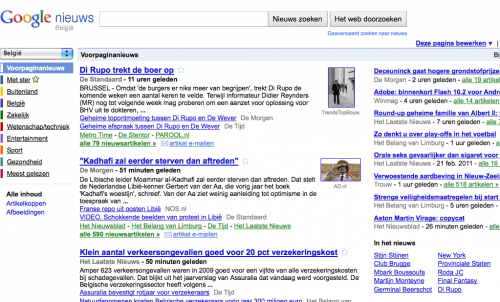Obscure Belgian Case Threatens To Open Copyright “Pandora’s Box” For Google In Europe
A 2006 Belgian case that found Google in breach of copyright law for indexing newspaper headlines and snippets without permission is now on appeal and approaching conclusion a little over four years later. In 2007 Google was ordered to pay fines and remove links and/or obtain permission from the newspaper copyright owners before indexing their […]
A 2006 Belgian case that found Google in breach of copyright law for indexing newspaper headlines and snippets without permission is now on appeal and approaching conclusion a little over four years later. In 2007 Google was ordered to pay fines and remove links and/or obtain permission from the newspaper copyright owners before indexing their content in Google News.
Google immediately appealed the decision and also took the position that the case was narrowly limited to the newspaper-specific facts. Google dismissed the significance and larger potential impact of the decision on Google’s approach to indexing content in Europe.

Google PR said in 2007 that unlike cases in the US or the UK, the ruling will be seen legally as specific to this particular situation rather than indexing in general. Google’s legal counsel, Yoram Elkaim, added:
“Because of the legal system in most European countries, there is no rule of precedence. That means the court here was really asked to apply the law on the specific situation and on the plaintiffs in this situation.”
It’s a nail-biter and the outcome is hard to predict. My instinct is that at least some of the lower court’s ruling will be upheld if not entirely.
If the decision is in fact upheld, essentially requiring Google to obtain permission from copyright owners to index their content, it might bleed beyond the boundaries of newspapers to a wider range of content owners and creators. There are probably a great many copyright holders (e.g., magazine publishers, online content publishers) that might seek some sort of compensation from Google if they can negotiate it.
Yet the Belgian court and other courts in Europe will probably recognize that the current robots.txt standard is sufficient to communicate a desire to be excluded from the general index — which almost no one wants for obvious reasons. I suspect European courts wouldn’t promote or codify the idea that Google must seek permission from site owners to index billions of links. That’s just unrealistic.
The climate in Europe today is much more “anti-Google” than it was when the case was originally decided four years ago. Judges aren’t supposed to let politics, “the mob” or personal prejudices come into play in their decision-making. At least in the US the judiciary is supposed to be a check on the “will of the majority.” But judges are humans and equally influenced by culture and events.
If the appeal goes against Google it could open a veritable Pandora’s Box of copyright-related headaches for Google in Europe.
Contributing authors are invited to create content for Search Engine Land and are chosen for their expertise and contribution to the search community. Our contributors work under the oversight of the editorial staff and contributions are checked for quality and relevance to our readers. The opinions they express are their own.
Related stories
New on Search Engine Land